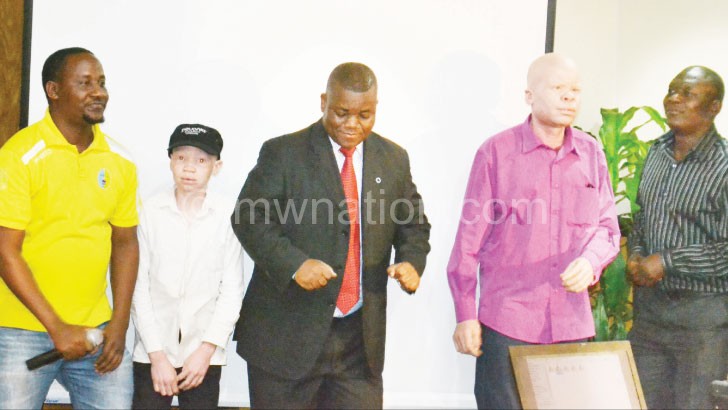Conversations towards change
Arts are powerful tool for transforming our communities because they act as a mirror of society.
Apart from advocating for change, arts speak language that all people, poor or rich, understand. The arts also connect the powerful and the weak citizens in society.

No wonder, the Malawi Police Service (MPS) and many other organisations are using arts to communicate messages with the public.
Last Sunday, arts took centre stage again when a campaign to end albino attacks and other human rights abuses kicked into motion.
To show that what was being said was serious, the Commissioner for Southern region police headquarters Dempster Chigwenembe left his comfortable chair and joined a dance performance on the stage.
Chigwenembe joined artists Felix Ntokoma and Allan Kholophethe who were performing an anti-albino attacks songs.
Joined by two children with albinism on the stage, Chigwenembe wowed the audience with how he sang: ‘Ndi ana athu, Tisawasale/ Ndi akazi anga, Tisawasale’. It was an appeal that touched many hearts at the event.
The emotional aspect coupled with the dance moves was too tempting to keep the high profile figures on their fluffy front seats.
Then, the entire room followed suit. It was such a rare moment which saw both the vulnerable and powerful sharing a common goal through music which brought them together despite their status and professional borders.
As the audience settled into their chairs once again, the Blantyre Community Policing’s (BCP) Arts Initiative had achieved its goal.
Even international artists believe art is not just to make people happy, it can be used as an agent of change.
No wonder, early last month, Malawi received a visitor from Netherlands, Ikenna Azuike, a Nigerian-born comedian who came to search for hot topics to be raised in his satirical and pop culture show called What’s Up Africa for BBC’s Focus on Africa.
Ikenna is a funny character who likes to bring important African
issues to life and his episodes on Malawi looked at different issues such as child marriage, drug shortages, floods, Malawi’s Olympic success and how the country is coping with asylum seekers from Mozambique.
Ikenna said profiling countries like Malawi on his show helps to highlight emerging issues that need global attention and intervention.
“It’s not all about entertaining people but bringing issues to the attention of the world leaders for action. For example, Malawi is currently struggling with the negative effects of child marriage which needs concerted global efforts,” he said.
He underscored the role of arts in influencing people’s mindset. Ikenna’s sentiments are shared by Chigwenembe.
In his remarks during the launch of BCP Arts Initiative, Chigwenembe said the Southern Region Police is doing all it can to reduce crime rates including brutal murders of persons with albinism.
“We are using every necessary strategy at our disposal including art to fight crime.
“I believe that through music we can raise awareness against human rights violation such as killings of persons with albinism and gender-based violence. Music has the power to change people’s mindset and contribute to society’s well-being,” he said.
He added that arts such as music, because of their entertaining, educative and informative nature, appeal to all sections of people as it is ‘universal language’.
“It is a powerful tool that can help the country create the much-needed change as far as awareness of emerging issues such barbaric killings, abduction and exhuming of bones for persons with albinism are concerned,” he explains.
According to Blantyre community policing coordinator Horace Chabuka, the music initiative has been initiated by Chirimba Township’ community policing business Watch committee.
“This is an initiative of southern region police through Blantyre community policing. And we are confident that it will help to bring change among communities,” said Chabuka.
He said through artists Kholophethe and Ntokoma of Ntokoma Studios, a musical album and single video has been produced.
“We want to take the message to the people for them to act against all sorts of human rights violations including the killing of persons with albinism,” he said.
Musician Lucius Banda is a popular artist who has worked with many organisations to bring change in the community.
He says even in politics, arts play an important role.
Banda cites the role artists played in changing the political landscape in the country from one-party rule to multi-party democracy.
“As artists, we fight for the voiceless whose rights are being suppressed. We can’t stand on the fence and watch while the poor are being denied justice or right to life, protection, food and education. We act,” he says.
However, the history of arts in Malawi is likened to the biblical tale of the rejected stone which became a cornerstone. Many quarters believe that arts suffer a big blow when it comes to funding from government yet is the most used medium for awareness campaigns that influence behaviour change or policy amendments.
For example, this year, in the 2016/17 National Budget, the department of Culture (Doc) has been allocated only K381 million on Overdraft Recurrent Budget (ORT) from K50 million last year.
Industry experts have described this budget as ‘punitive’ to arts bodies and activists.
“It’s very funny how institutions and politicians in the country turn to arts when they want to garner support for their campaigns yet in the National Budget, arts are given peanuts,” says Felix Njawala, chairperson of E-Wallet music competition. n





